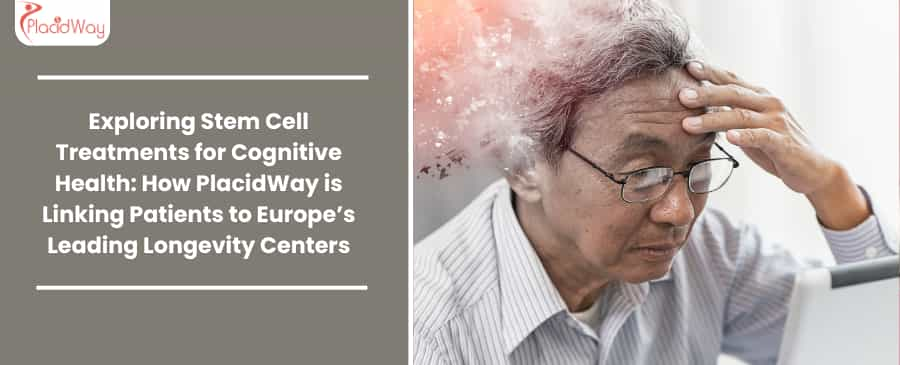
Is maintaining your cognitive sharpness a priority for you? In a world where mental acuity is more valuable than ever, many are seeking innovative ways to support brain health, enhance memory, and combat the challenges of cognitive decline. The thought of our cognitive abilities dimming with age or due to neurological conditions is a significant concern for people worldwide. Fortunately, the field of regenerative medicine is offering new hope.
Emerging scientific understanding and pioneering medical advancements are now pointing towards stem cell cognitive health Europe as a promising frontier. Stem cells, with their remarkable ability to repair and rejuvenate, are being explored for their potential to address a range of brain health issues. Europe has positioned itself at the forefront of this research and application, with several countries becoming hubs for cutting-edge therapies. For international patients seeking these advanced treatments, PlacidWay is dedicated to creating awareness, providing crucial information, and forging pathways to Europe’s leading longevity and brain health centers. Join us as we explore this exciting field and how PlacidWay can help you navigate your options for a brighter cognitive future.
How Can Stem Cells Impact Cognitive and Neurological Health?
You might be wondering, how exactly can these tiny cells make a difference when it comes to something as complex as our brain? The science behind stem cell therapy for cognitive and neurological health is fascinating and offers a beacon of hope. Stem cells are essentially the body's internal repair system. They are unique because they can develop into many different specialized cell types and can also replicate themselves.
When it comes to brain health, their potential lies in several key actions:
- Replacing Damaged Neurons: Our brain cells, or neurons, can become damaged or die due to aging, injury, or disease. Some types of stem cells have shown the potential to differentiate into new neurons, potentially replacing those that have been lost. This could help restore some lost function.
- Reducing Neuroinflammation: Chronic inflammation in the brain is a common factor in many neurodegenerative conditions like Alzheimer's and Parkinson's, and it also plays a role in age-related cognitive decline. Mesenchymal Stem Cells (MSCs), a type frequently used in these therapies, are known for their powerful anti-inflammatory properties. They can help calm this inflammation, creating a healthier environment for brain cells to survive and function.
- Promoting Neurogenesis and Synaptogenesis: Beyond just replacing cells, stem cells can release special growth factors, known as neurotrophic factors. These substances encourage the brain's own healing processes, including neurogenesis (the birth of new neurons) and synaptogenesis (the formation of new connections between neurons). Stronger and more numerous connections are vital for learning, memory, and overall cognitive processing.
- Improving Blood Flow: A healthy brain needs a good supply of oxygen and nutrients, delivered by blood vessels. Stem cells can stimulate angiogenesis – the creation of new blood vessels. This improved circulation can help nourish brain tissue and support its repair.
- Modulating the Immune System: In some neurological conditions, the body's immune system can mistakenly attack healthy brain tissue. MSCs can help modulate this immune response, protecting the brain from further damage.
The types of stem cells commonly explored for stem cell treatment for cognitive decline include MSCs (often sourced from umbilical cord tissue, bone marrow, or adipose tissue) due to their safety profile, regenerative capabilities, and immunomodulatory effects. Neural Stem Cells (NSCs) are also of great interest, though their use can be more complex. These therapies aim not just to slow down degeneration but to actively support repair and enhance the brain's natural ability to heal itself.
Why Europe? A Look at the Continent's Advanced Approach to Stem Cell Therapy for Brain Health
When considering advanced medical treatments like stem cell therapy for cognitive issues, the destination matters. Europe has carved out a significant reputation as a leader in the research, development, and application of stem cell therapy brain health Europe protocols. Several factors contribute to the continent's strong position in this innovative field.
-
Leading Research and Innovation: Europe is home to numerous world-class universities, research institutions, and biotechnology companies actively involved in advancing stem cell science. There's a strong tradition of collaboration between these entities and clinical centers, ensuring that breakthroughs in the lab can be translated into potential treatments for patients. Ongoing clinical trials across the continent are continually exploring the efficacy of stem cells for various neurological and cognitive conditions.
-
Regulatory Environment and Safety Standards: European Union (EU) member states, and other European countries, generally have well-defined regulatory frameworks for advanced therapies like stem cell treatments. The European Medicines Agency (EMA) plays a role in the authorization of cell-based medicinal products, ensuring they meet stringent quality, safety, and efficacy standards. This commitment to oversight provides a level of assurance for patients seeking care. Ethical considerations are also paramount in European medical practice.
-
Specialized Clinics and Expertise: The continent boasts a growing number of specialized stem cell clinics Europe longevity and neurological health focused. These centers are often staffed by highly skilled medical professionals – neurologists, neurosurgeons, and specialists in regenerative medicine – who have dedicated expertise in treating complex brain conditions. They are adept at tailoring treatment plans to individual patient needs.
-
Range of Treatment Options: European centers often offer access to a variety of stem cell types (such as MSCs) and advanced application methods. This allows for a more nuanced approach to treatment, depending on the specific cognitive condition being addressed and the patient's overall health profile.
-
Accessibility and Medical Tourism Infrastructure: Europe is well-connected, and many countries have developed excellent infrastructure to support medical tourism. Patients travel to various European nations to access these therapies. While countries like Germany and Switzerland are known for their pioneering work and high standards (often with higher costs), nations in Central and Eastern Europe, such as Slovakia, Slovenia, Bulgaria, Poland, Serbia, and Turkey (which bridges Europe and Asia), are gaining recognition for offering high-quality, more affordable stem cell treatment for neurological health Europe options. This provides a spectrum of choices for international patients.
Choosing Europe for stem cell therapy for cognitive health means accessing a hub of scientific advancement, rigorous safety standards, specialized medical expertise, and a commitment to improving the lives of individuals facing brain health challenges.
Targeting Cognitive Challenges: What Conditions Can Stem Cell Therapy Address?
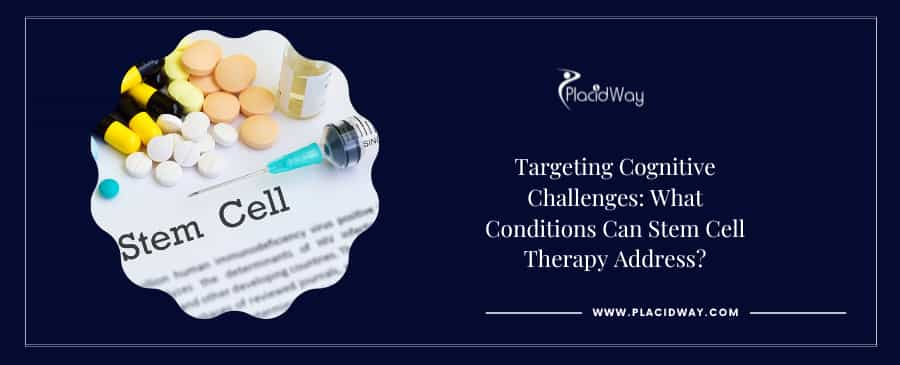
Stem cell therapy holds promise for a variety_of cognitive and neurological conditions, primarily by aiming to reduce inflammation, protect existing neurons, encourage the formation of new neural connections, and potentially replace damaged cells. While research is ongoing and it's not a cure-all, regenerative medicine for brain health Europe is actively exploring applications for several key areas:
-
Age-related Cognitive Decline & Memory Loss: Many individuals experience a natural decline in memory sharpness and cognitive processing speed as they age. Stem cell therapies, particularly those using Mesenchymal Stem Cells (MSCs), are being investigated for their potential to rejuvenate the brain environment, reduce low-grade chronic inflammation (often called "inflammaging"), and support neural plasticity, potentially improving memory, focus, and overall mental clarity in aging individuals.
-
Alzheimer's Disease: Alzheimer's, the most common form of dementia, is characterized by the buildup of amyloid plaques and tau tangles, leading to neuron death and severe cognitive impairment. Stem cell research for Alzheimer's focuses on several strategies: reducing the amyloid and tau pathology, decreasing neuroinflammation, delivering neurotrophic (growth) factors to support surviving neurons, and potentially generating new neural cells. While still largely experimental, early findings offer hope for slowing disease progression and improving quality of life.
-
Parkinson's Disease: While primarily known as a movement disorder, Parkinson's Disease also frequently involves cognitive symptoms, such as executive dysfunction and memory problems, especially in later stages. Stem cell therapies aim to protect and potentially replace the dopamine-producing neurons lost in Parkinson's, and also to reduce the neuroinflammation that contributes to broader neuronal damage, which could positively impact cognitive aspects.
-
Stroke Recovery: A stroke can cause significant brain damage due to a lack of blood flow, leading to a range of cognitive and physical disabilities. Stem cells are being studied for their ability to promote neuro-restoration after a stroke. They may help by reducing inflammation in the damaged area, stimulating the formation of new blood vessels (angiogenesis), protecting surviving neurons from further damage, and encouraging the brain to rewire itself (neuroplasticity), potentially aiding in the recovery of cognitive functions like speech and memory.
-
Traumatic Brain Injury (TBI): TBIs can result in long-term cognitive, emotional, and physical challenges. Stem cell therapy is explored for its potential to mitigate secondary damage processes that occur after the initial injury, such as inflammation and cell death. By creating a more favorable healing environment, stem cells might support the brain's natural repair mechanisms and improve cognitive outcomes.
-
Vascular Dementia: This form of dementia is caused by reduced blood flow to the brain, often due to small strokes or other vascular issues. Stem cells' ability to promote angiogenesis and reduce inflammation could be beneficial in improving cerebral circulation and protecting brain tissue, potentially slowing the progression of vascular dementia and improving cognitive symptoms.
It's crucial for patients and their families to understand that for many of these conditions, stem cell treatment for cognitive decline is aimed at improving symptoms, enhancing quality of life, and potentially slowing progression, rather than offering a complete cure, especially for advanced neurodegenerative diseases.
What to Expect from Stem Cell Treatment for Cognitive Health in Europe
If you're considering stem cell therapy for cognitive health in Europe, understanding the process and what to expect can help you make informed decisions. The journey typically involves several stages, and treatments are often personalized.
-
Types of Stem Cell Applications: The way stem cells are administered depends on the specific condition, the type of cells used, and the clinic's protocols. Common approaches include:
- Systemic Application (e.g., Intravenous Infusions): Often, Mesenchymal Stem Cells (MSCs) are administered through an IV drip. These cells can then travel throughout the body, migrating to sites of inflammation or injury, including the brain. This method is valued for its systemic anti-inflammatory and regenerative effects.
- Targeted Delivery (e.g., Intrathecal Injections): In some cases, for more direct access to the central nervous system, stem cells might be injected into the cerebrospinal fluid (the fluid surrounding the brain and spinal cord). This method, known as an intrathecal injection, bypasses the blood-brain barrier. The suitability of this approach is determined by medical specialists.
- Cell Sources: Therapies may use autologous stem cells (taken from the patient’s own body, such as from fat tissue or bone marrow) or allogeneic stem cells (obtained from a screened and healthy donor, often from umbilical cord tissue). Allogeneic MSCs from umbilical cords are popular due to their youthfulness, high regenerative potential, and low immunogenicity (less likely to be rejected).
-
The Treatment Journey: While specifics vary, a general pathway often includes:
- Initial Consultation and Assessment: This usually starts with a detailed review of your medical history, current cognitive status (often including neurological exams and imaging like MRI scans), and treatment goals. Many reputable European centers offer remote consultations for international patients.
- Personalized Treatment Planning: If you're deemed a suitable candidate, the medical team will develop a personalized treatment plan. This outlines the type of stem cells, dosage, number of administrations, route of delivery, and any supportive therapies.
- The Procedure: The administration of stem cells is typically minimally invasive. IV infusions are straightforward. If cell harvesting is needed (for autologous treatments), this will be done prior to the main therapy. Your stay in the European country will depend on the treatment protocol – it could range from a few days to a couple of weeks.
- Follow-up Care and Monitoring: After the treatment, you'll receive follow-up instructions. Reputable clinics will have a plan for monitoring your progress, which may involve periodic check-ins (possibly remote) and, in some cases, recommendations for repeat treatments or ongoing supportive care (like cognitive rehabilitation or lifestyle adjustments).
-
Important Considerations:
- Realistic Expectations: It's vital to have a clear understanding of what longevity treatments Europe stem cells can offer for cognitive health. For many chronic neurological conditions, the goal is to improve quality of life, manage symptoms, enhance cognitive function, and potentially slow disease progression. Complete reversals are rare, especially in advanced stages of disease.
- Safety and Potential Risks: Stem cell therapy, particularly with MSCs, generally has a good safety profile. Common side effects are usually mild and temporary, such as fatigue or flu-like symptoms after an IV infusion, or soreness at an injection site. However, as with any medical procedure, potential risks will be discussed by your doctor.
- Choosing the Right Center: The expertise of the medical team and the accreditation of the facility are paramount. Look for centers with experience in treating neurological and cognitive conditions, transparent protocols, and a commitment to patient safety and ethical practices.
Navigating these options requires careful research and open communication with potential providers.
Understanding the Costs of Stem Cell Cognitive Health Treatments in Europe
The financial aspect is a significant consideration for anyone exploring stem cell cognitive health Europe options. Costs can vary widely based on several factors, but one of the reasons patients look to Europe is the potential for accessing high-quality care at a more manageable price point compared to some other regions, particularly for advanced and specialized treatments.
On average, the cost of stem cell therapy in Europe for neurological or cognitive conditions can range from approximately $5,000 to $35,000 USD, and sometimes higher for very intensive or multi-stage protocols. For example, specific stem cell treatment for neurological health Europe programs focused on conditions like MS, Parkinson's, or post-stroke recovery in some Eastern European countries might start from $5,000-$12,000, while more comprehensive anti-aging protocols with cognitive benefits or treatments in Western European countries like Germany or Switzerland could be in the $15,000-$35,000+ range. These figures are broad estimates, and the final cost depends heavily on the individual case.
To provide a clearer picture, here's an illustrative cost comparison table based on regional differences and program focus within Europe:
Disclaimer: The prices listed above are general estimates for illustrative purposes and can vary significantly. Actual costs depend on the specific country, the clinic's reputation, the exact nature and complexity of the treatment protocol (type of cells, number of sessions), included services (diagnostics, accommodation, aftercare), and individual patient needs. PlacidWay can assist in obtaining personalized quotes.
Here's a breakdown of what influences the overall expense:
- Type and Source of Stem Cells: The kind of stem cells used (e.g., MSCs from umbilical cord, adipose tissue, bone marrow), their processing, and whether they are autologous (from the patient) or allogeneic (from a donor) affect the cost.
- Number of Cells and Sessions: Higher doses of stem cells or protocols requiring multiple treatment sessions will naturally increase the price.
- Complexity of the Condition: Treating a more advanced or complex neurological disorder may require a more intensive and thus more expensive approach.
- Country and Clinic Reputation: Costs are generally higher in Western European countries (e.g., Germany, Switzerland) known for very advanced facilities and research, compared to many high-quality centers in Central or Eastern European countries (e.g., Slovakia, Poland, Serbia, Slovenia, Bulgaria) or Turkey, which often offer more affordable options. The clinic's specific expertise, technology, and level of personalized service also play a role.
- Inclusions in the Treatment Package: It's crucial to understand what the quoted price includes. Does it cover initial consultations, diagnostic tests (MRIs, blood work), the stem cell procedure itself, hospital stay (if required), medications, and follow-up care?
- Additional Expenses: International patients must also budget for:
- Travel costs (flights, visas if needed).
- Accommodation during their stay.
- Daily living expenses.
- Potential costs for a travel companion.
- Post-treatment medications or therapies back home.
- Insurance Coverage: Stem cell therapies for many cognitive and neurological conditions are still considered experimental or investigational by many insurance providers, especially for international treatments. Therefore, patients usually need to cover the costs out-of-pocket.
PlacidWay can assist you in obtaining detailed quotes from various European centers, helping you understand the full scope of potential costs and what is included in treatment packages, ensuring transparency in your financial planning.
The PlacidWay Bridge: Connecting You to Europe’s Foremost Longevity and Brain Health Centers
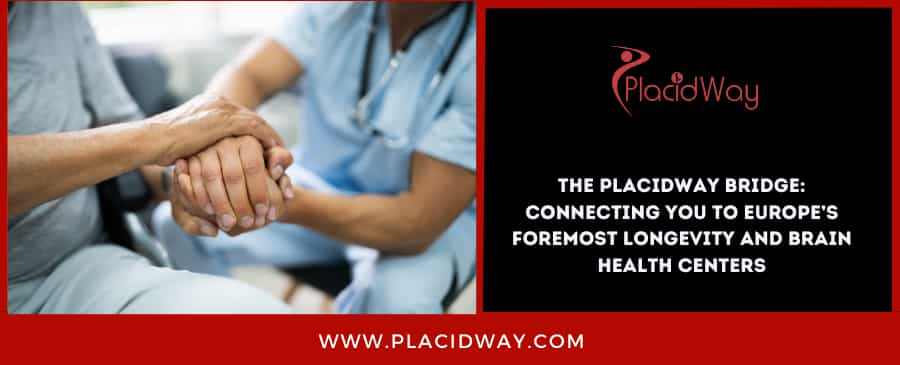
Navigating the world of international medical treatment, especially for something as specialized as stem cell therapy for cognitive health, can feel overwhelming. This is where PlacidWay steps in, acting as your trusted partner and guide. Our mission is to simplify your journey, providing clarity, access, and support as you explore stem cell therapy brain health Europe options. We aim to connect you with Europe's leading centers that specialize in longevity and brain wellness, including those offering innovative anti-aging stem cell therapy Europe with cognitive benefits.
Here’s how PlacidWay makes a difference for international patients:
-
Creating Awareness and Providing Education: We believe that informed patients make the best decisions. PlacidWay provides comprehensive resources and up-to-date information about the potential of stem cell therapy for various cognitive conditions. We help you understand how these treatments work, what the latest research suggests, and what options are available in different European countries.
-
Vetted Network of European Centers: Finding the right clinic is crucial. PlacidWay has an extensive network of healthcare providers across Europe, including specialized stem cell clinics Europe longevity and neurological health focused. We carefully evaluate centers based on their expertise, treatment protocols, patient safety records, accreditations, and experience with international patients. This pre-screening process saves you time and provides a greater sense of security.
-
Personalized Patient Facilitation: Your health journey is unique. We offer personalized assistance tailored to your specific needs and goals. This includes:
- Helping you with initial inquiries and gathering necessary medical information.
- Coordinating remote consultations with qualified European medical specialists.
- Assisting you in understanding the proposed treatment plans, expected outcomes, and detailed cost breakdowns.
-
Streamlining the Medical Travel Process: Traveling abroad for medical care involves many logistical considerations. PlacidWay offers guidance and support to make this process smoother:
- Providing information on travel arrangements to your chosen European destination (e.g., Slovakia, Bulgaria, Slovenia, Turkey, Germany, etc.).
- Assisting with finding suitable accommodation options.
- Offering insights into local support services to ensure your stay is comfortable and stress-free.
-
Commitment to Informed Decision-Making and Transparency: We empower you by providing clear, unbiased information. Our goal is to ensure you have everything you need to make a well-informed decision about your cognitive health treatment, free from pressure and with full transparency regarding procedures and costs.
By partnering with PlacidWay, you gain access to a wealth of knowledge, a network of trusted European medical centers, and dedicated support throughout your journey towards enhanced cognitive well-being. We are here to bridge the gap between you and the advanced regenerative medicine for brain health Europe has to offer.
The Evolving Landscape of Regenerative Medicine for Brain Health in Europe
The field of regenerative medicine for brain health Europe is not static; it's a dynamic and rapidly evolving area of science and medicine. The progress made in recent years offers tremendous hope, and the future looks even more promising for individuals grappling with cognitive decline and neurological disorders. European researchers and clinicians are at the vanguard of many of these exciting developments.
-
Continuous Advancements in Research: Across Europe, scientists are delving deeper into understanding how stem cells work within the brain. Research is focused on optimizing cell types, improving delivery methods for better targeting of affected brain regions, and enhancing the survival and integration of transplanted cells. Studies are also exploring combination therapies, where stem cells might be used alongside other treatments to achieve synergistic effects.
-
More Personalized and Targeted Therapies: The future likely holds more personalized approaches to stem cell treatment for cognitive decline. Advances in genetic testing and biomarker identification may help doctors tailor stem cell therapies more precisely to an individual's specific condition and biological makeup. This could lead to even better outcomes and reduced variability in patient responses.
-
Proactive Brain Health and Prevention: There's a growing emphasis on proactive brain health and the potential role of longevity treatments Europe stem cells in not just treating existing conditions but also in preventing or delaying the onset of age-related cognitive decline. Early interventions using regenerative strategies could become a key component of maintaining cognitive vitality well into older age.
-
A Hopeful Outlook: For patients and families affected by conditions like Alzheimer's, Parkinson's, stroke, and other neurological challenges, the continued progress in European stem cell research and therapy offers a significant beacon of hope. While cures may still be on the horizon for some complex diseases, the potential to significantly improve quality of life, slow disease progression, and enhance cognitive function is becoming increasingly tangible.
PlacidWay remains committed to staying abreast of these future horizons, ensuring that we can continue to connect patients with the most promising and ethically sound stem cell treatments as they become available through Europe's leading longevity and neurological health centers.
Frequently Asked Questions (FAQs) about Stem Cell Therapy for Cognitive Health in Europe
Here are answers to some common questions about pursuing stem cell therapy for cognitive health in European countries:
How effective is stem cell treatment for cognitive decline in Europe?
The effectiveness of stem cell treatment for cognitive decline can vary depending on the underlying cause, the stage of the condition, the type of stem cells used, and individual patient factors. In Europe, reputable clinics focus on protocols aimed at reducing neuroinflammation, supporting neuronal health, and promoting regeneration. While not a guaranteed cure, many patients report improvements in memory, focus, quality of life, or a slowing of disease progression. It's crucial to have realistic expectations and discuss potential outcomes with a specialist.
Which European countries are best for stem cell cognitive health Europe treatments?
Several European countries offer advanced stem cell cognitive health Europe treatments. Nations like Germany and Switzerland are known for cutting-edge research and high-end facilities, often with higher costs. Countries in Central and Eastern Europe, such as Slovakia, Slovenia, Poland, Serbia, as well as Turkey, are increasingly recognized for providing high-quality, specialized stem cell therapies at more affordable price points. The "best" country depends on your specific needs, budget, and the expertise available for your condition.
What is the typical cost for stem cell therapy brain health Europe?
The cost for stem cell therapy brain health Europe can range significantly, typically from $5,000 to $35,000 USD, or more. This variation is due to the country, the specific clinic, the type and number of stem cells, the complexity of the neurological condition, and the number of sessions. Generally, Western European countries may have higher costs than well-regarded clinics in Eastern or Central Europe. PlacidWay can help you obtain detailed quotes.
Is anti-aging stem cell therapy Europe beneficial for brain function?
Yes, many anti-aging stem cell therapy Europe programs incorporate components aimed at enhancing brain function and cognitive vitality. The systemic regenerative and anti-inflammatory effects of stem cells can contribute to a healthier brain environment, potentially improving focus, memory, and reducing "brain fog" associated with aging. Longevity centers often view cognitive health as a key pillar of overall youthful aging.
How does PlacidWay help find reputable stem cell clinics Europe longevity focused?
PlacidWay assists by connecting you with a network of vetted stem cell clinics Europe longevity and neurological health focused. We provide detailed information on these centers, their specializations, and treatment approaches. We help facilitate communication, arrange consultations, and ensure you receive transparent information regarding procedures and costs, enabling you to make an informed choice for your health needs.
What are the main safety considerations for stem cell treatment for neurological health Europe?
Safety is paramount. Reputable European clinics offering stem cell treatment for neurological health Europe adhere to strict safety protocols, including thorough donor screening (for allogeneic cells), sterile processing, and expert administration. Mesenchymal Stem Cells (MSCs) generally have a good safety profile with minimal risk of rejection or serious side effects. However, any medical procedure has potential risks, which should be thoroughly discussed with your treating physician.
Take the Next Step Towards Enhanced Cognitive Well-being with PlacidWay
The journey to protect and enhance your cognitive health is one of the most important investments you can make in your overall well-being and quality of life. As we've explored, stem cell therapy is emerging as a groundbreaking field, offering new possibilities for those concerned with age-related cognitive decline, memory loss, or the impacts of neurological conditions. Europe stands out as a region where scientific innovation, advanced medical care, and a commitment to patient well-being converge, making it a prime destination for these sophisticated treatments.
Imagine a future with greater mental clarity, sustained focus, and a more resilient memory. While science continues to unlock the full potential of stem cells, the progress being made at leading European longevity and brain health centers is undeniably encouraging. Taking proactive steps today can make a significant difference in your cognitive vitality for years to come.
Ready to explore how stem cell therapy in Europe can support your cognitive health? Contact PlacidWay today for a personalized consultation and connect with leading longevity centers! Let us help you navigate your options and walk on a path to a brighter, sharper future.



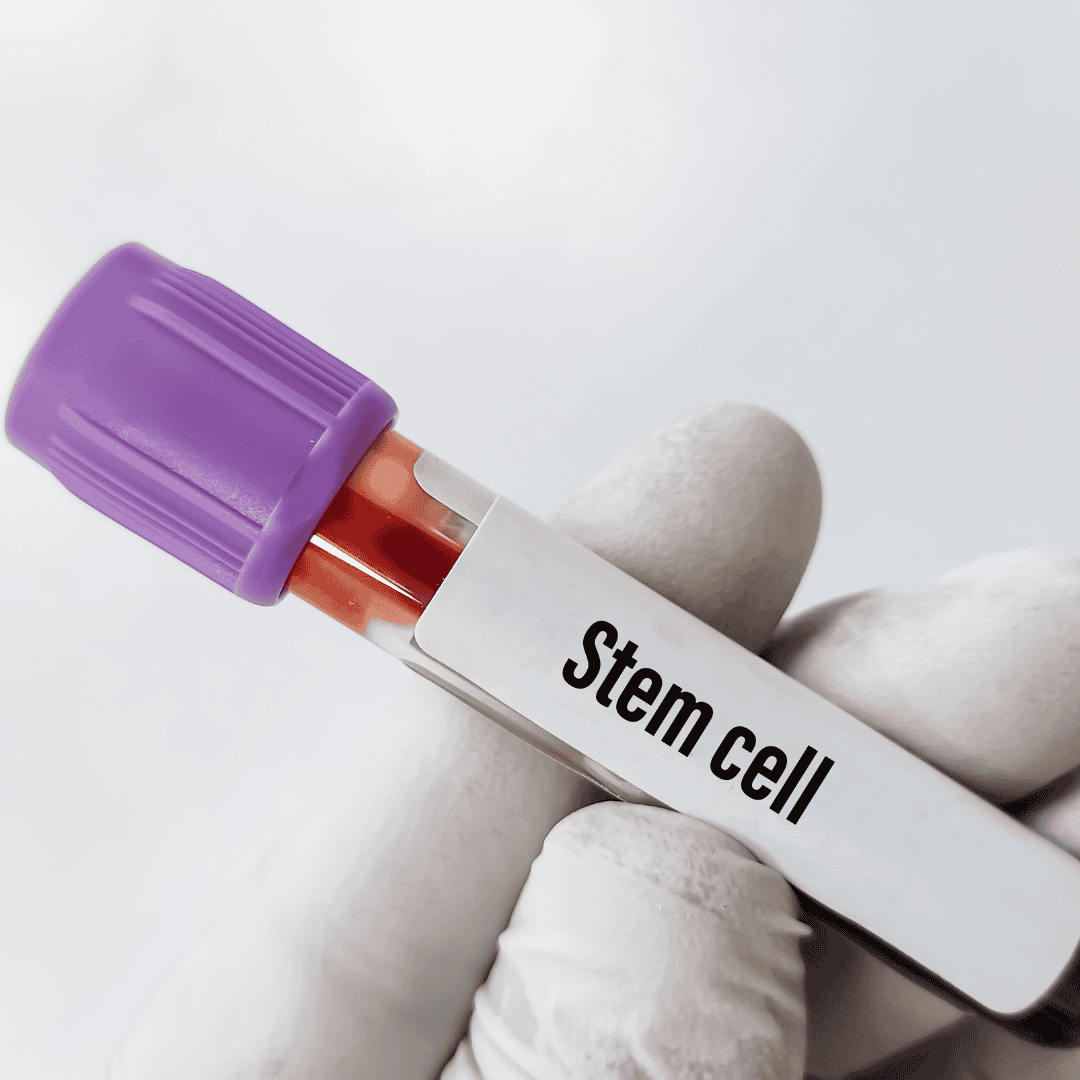






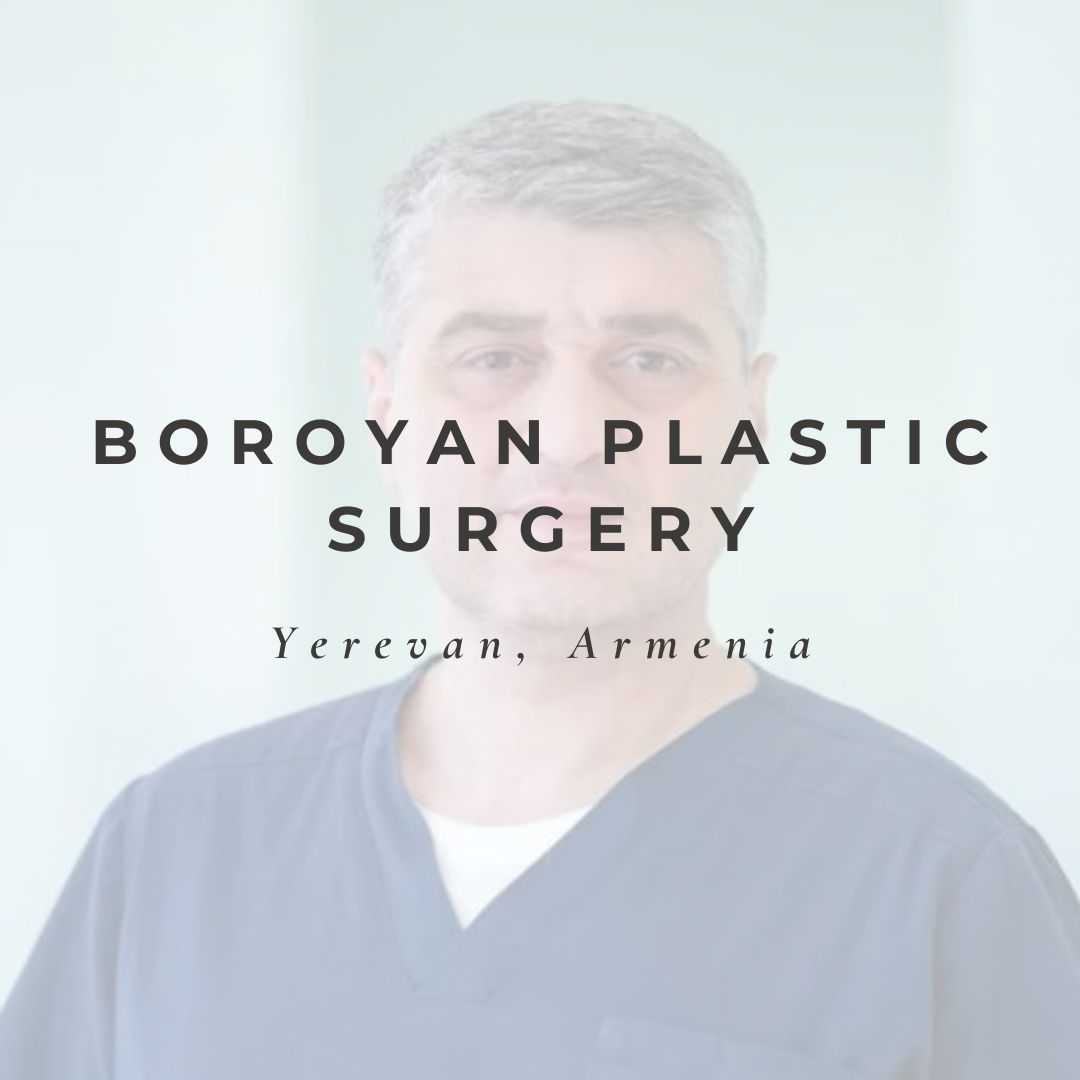

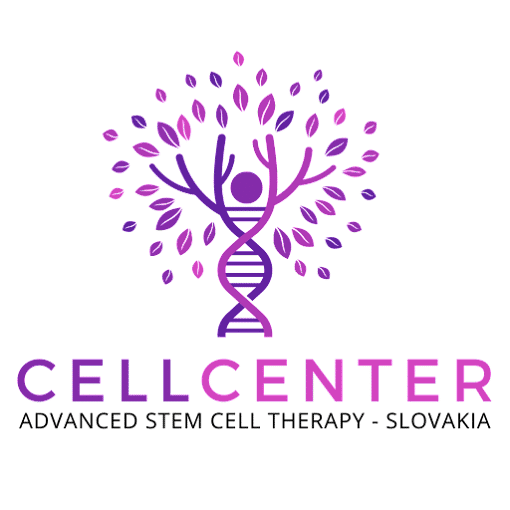


Share this listing